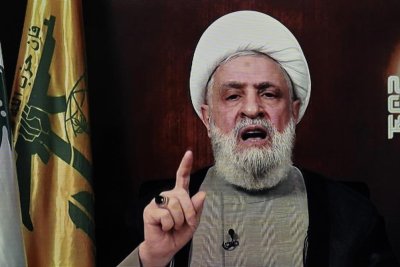
Hezbollah leader Sheikh Naim Qassem said his group will not “surrender its weapons” while Israel, which significantly weakened Hezbollah during a 14-month war last year, remains a threat and continues to strike Lebanon, occupy parts of its territories and hold Lebanese prisoners. File Photo by Wael Hamzeh/EPA
BEIRUT, Lebanon, Aug. 15 (UPI) — Hezbollah leader Sheikh Naim Qassem issued a strong warning to the Lebanese government against moving forward with its plan to disarm the Iran-backed militant group, accusing it of acting on orders from the United States and Israel, and threatening that such a move could spark a civil war.
Qassem said his group will not “surrender its weapons” while Israel, which significantly weakened Hezbollah during a 14-month war last year, remains a threat and continues to strike Lebanon, occupy parts of its territories and hold Lebanese prisoners.
“We will fight this as a Karbala-style battle if necessary, confronting this Israeli-American scheme no matter the cost, confident that we will emerge victorious,” he said in a televised speech released Friday.
To Muslim Shiites, Karbala means standing against tyranny, sacrifice and steadfastness in the face of overwhelming odds.
Qassem’s strong warning came after he met with Iran Supreme National Security Council Secretary Ali Larijani, who visited Beirut on Wednesday, where he heard firm statements from President Joseph Aoun and Prime Minister Nawaf Salam rejecting any interference in their country’s internal affairs.
Larijani tried to play down recent comments by Iranian political and military officials who criticized the Lebanese government for endorsing the objectives of a U.S.-proposed plan to disarm Hezbollah and for tasking the Lebanese Army with developing a strategy to enforce a state monopoly on weapons by the end of the year.
The Iranian officials also maintained that Hezbollah, which has been funded and armed by Iran since its formation in the early 1980s, would never be disarmed.
Qassem said the government took “a very dangerous decision” last week, exposing the country to “a major crisis” and stripping it of “defensive weapons during times of aggression.”
He also accused it of “serving the Israeli agenda” and carrying out “an order” from the U.S. and Israel “to end the resistance, even if that leads to a civil war and internal strife.”
He held the government fully responsible for any sectarian strife, internal explosion, or destruction of Lebanon and warned it against dragging the Army into such an internal conflict.
Qassem, said, however, there “is still an opportunity, room for dialogue and for making adjustments before reaching a confrontation that no one wants.”
He added that Hezbollah was ready for confrontation and that demonstrations will be held across Lebanon, including “heading to the U.S. Embassy,” located in Awkar, north of Beirut.
Hezbollah, which reportedly lost the bulk of its military capabilities in ongoing Israeli airstrikes targeting its positions in southern and eastern Lebanon, accepted the ceasefire accord to stop a war that killed or wounded more than 20,000 people and left border villages in southern Lebanon in ruins.
While it implicitly agreed to discuss its weapons as part of a national defense strategy, the group resisted government efforts to set a timetable for disarming — a key U.S. condition for unlocking much-needed international and Gulf Arab funding to support Lebanon’s reconstruction and economic recovery.
Lebanon’s decision to set a timeline for Hezbollah disarming was mainly motivated by the risk of another devastating war with Israel and of losing well-needed funds to rebuild its war-devastated regions.
“Let us work together to build the country, so that we may all win,” Qassem said. “There is no life for Lebanon if you choose to stand on the opposite side.”